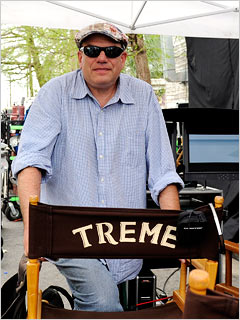The first season of HBO’s Treme came to a close on Sunday. Afterwards, David Simon talked about the first season with Alan Sepinwall at hitfix.com. The conversation often deals with one of the central issues Treme faced—how different it is from conventional television. Recently, I addressed the complaint that nothing happens on the show; Simon addresses it as well:
 I absolutely disagree, but I think you can only make the actual judgment when you look back and see what the characters have been through and what it represented. But it’s not that it lacks plot. What it lacks is the life and death stakes of the television trope. If you tell me that somebody is going to lose the love of her life, which is a restaurant, and it’s going to happen in real time, and we’re going to see them make a choice to abandon their city—that’s an awful lot that’s happened to a character. On the other hand, are you measuring it by asking, “Did I see a gun put to this person’s head? Did I see them raped? Did I see them wreck their car drunkenly and end up in the hospital? Were they put on trial for their life? Were they sent into an ER and the doctors hovered over them making life and death decisions? Were they hurtled into the West Wing where they had to consult on a decision that would mean the lives and deaths of thousands?” Those are the standard tropes of a standard television drama. I’m uninterested in telling a story that is a lie, and those are not the stakes of post-Katrina New Orleans, and I’m interested in post-Katrina New Orleans.
I absolutely disagree, but I think you can only make the actual judgment when you look back and see what the characters have been through and what it represented. But it’s not that it lacks plot. What it lacks is the life and death stakes of the television trope. If you tell me that somebody is going to lose the love of her life, which is a restaurant, and it’s going to happen in real time, and we’re going to see them make a choice to abandon their city—that’s an awful lot that’s happened to a character. On the other hand, are you measuring it by asking, “Did I see a gun put to this person’s head? Did I see them raped? Did I see them wreck their car drunkenly and end up in the hospital? Were they put on trial for their life? Were they sent into an ER and the doctors hovered over them making life and death decisions? Were they hurtled into the West Wing where they had to consult on a decision that would mean the lives and deaths of thousands?” Those are the standard tropes of a standard television drama. I’m uninterested in telling a story that is a lie, and those are not the stakes of post-Katrina New Orleans, and I’m interested in post-Katrina New Orleans.
Simon’s emphasis on telling the truth has led to interesting questions: Is the truth good television? And would people recognize it if they saw it?
For instance, Pat Finn at San Diego’s KPBS wrote, “if someone wants to produce an HBO drama series set in NOLA, it would be nice if there were actually some drama in it. Instead, this show seems to be about the producers being cool.” One of the readers answered (in part):
Do we want reality or entertainment? In the hypothetical Pat supposes—that the viewer be entertained more than be informed about the reality of post-Katrina existence—is a sad comment to make. The plot line’s go nowhere? LIFE WENT NOWHERE!
While Finn’s comment is typical of what Simon spoke of, the reader’s comment seems to concede the point, arguing not that the show’s entertaining but that it’s real, as if something can’t be both.
 At the Chicago Tribune, Maureen Ryan wrote:
At the Chicago Tribune, Maureen Ryan wrote:
Even if Creighton remained too one-dimensional for my taste, Toni Bernette’s silent pain as she realized that the city her husband loved had fatally broken his heart was moving as well. Thanks to Melissa Leo’s finely observed work and Toni’s likable doggedness as she moved through New Orleans’ Kafkaesque legal system, the Toni-LaDonna story line built a low-key yet satisfying momentum. And though many of his rants, lectures and monologues embodied the predictable and pedantic aspects of “Treme,” by depicting his last moments with subtlety and grace, “Treme” paid tribute to those whose deaths could be at least partly attributed to Katrina—even months after the flood waters receded.
She wasn’t alone in her objections to John Goodman’s Creighton Bernette (which Simon addresses in the interview with Alan Sepinwall), but her comment strikes the issue I’ve wondered about—can people understand what life was like here then. A woman who many found intimidatingly tough one night said she was moving away because she was tired of starting the day crying while reading the paper. People became caricatures of themselves. Some people became harder to read while some became transparent. Can viewers get that? I think so because it happens everywhere. You don’t have to have gone through a hurricane to be complex, but viewers are so rarely asked to deal with people as they really are on television that I understand people’s frustration.
The finale did everything that the season did well. Davis’ tour was a little tourist bureau for my tastes, but the breakfast of beignets and Boutte was inspired and oddly possible. This season belonged to LaDonna and Toni Bernette, and their emotional releases were as powerful and beautiful as Albert Lambreaux’s determination to mask Indian with a ragtag gang in cannibalized suits in a half-empty neighborhood. And you don’t have to live here to get that.
 … One more thing: Dave Walker at The Times-Picayune has done of great job of explicating Treme; here’s an additional bit of lore/background for the files. In the finale, Annie is reading the March 2006 OffBeat in Jackson Square and tells Harley that Lucinda Williams is playing that night, and that Car Wheels on a Gravel Road is her favorite Lucinda album.
… One more thing: Dave Walker at The Times-Picayune has done of great job of explicating Treme; here’s an additional bit of lore/background for the files. In the finale, Annie is reading the March 2006 OffBeat in Jackson Square and tells Harley that Lucinda Williams is playing that night, and that Car Wheels on a Gravel Road is her favorite Lucinda album.
Steve Earle, who plays Harley, was one of the producers for that album. In September 1997, The New York Times Magazine ran the story “Lucinda Williams is in Pain,” depicting her as a mess trying to make an album and unable to make necessary decisions. After cutting the album once, she re-recorded it with Earle producing, then recorded it again without him. In an interview with the New York Observer‘s David Bowman, Earle recalls the situation:
“I felt really bad that happened,” Mr. Earle said about the article. “She took our tracks to the West Coast—a project that had just been jinxed from the start with a whole bunch of weird junk—and her manager invited a fucking journalist to the recording sessions! You close ranks when shit like that happens.” He paused. “Lucinda and I get along fine now. Although I pissed her off when I told an interviewer, ‘Lucinda made a great record, but I don’t think I’ll produce girls anymore.'” He let loose a bad-boy laugh. “I couldn’t help it. I just said it because it was funny. I don’t have a sexist bone in my body. I just wasn’t raised that way.”
—Alex Rawls




